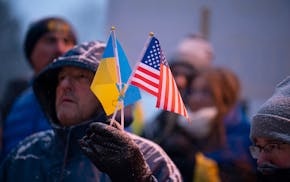Opinion editor's note: Strib Voices publishes a mix of material from 11 contributing columnists, along with other commentary online and in print each day. To contribute, click here.
•••
On a lovely spring night two years ago, I met Alia Saleeban, a biology major and senior at Howard University. What was so special about that moment was that Alia was talking with Antony Blinken, then the secretary of state, and we were celebrating Eid al-Fitr, a Muslim holy day, at Blair House in Washington D.C., an official venue for diplomacy for the U.S. government. She has spoken out globally in support of women's religious freedom, and Alia's words of youthful hope in that historic setting were inspiring. She helped me believe in a bright future.
As I reflect on the current state of affairs, and as the U.S. grapples with questions about our leadership and governance, particularly the role (or the lack thereof) of the federal government in our education systems, I find inspiration in knowing that our future depends on young people like Alia.
The World Economic Forum recently projected that in the next five years, there will be a net increase of 78 million jobs worldwide. Young people need to be skilled for these jobs in order to keep the economy growing and to provide for their families. As the father of four children, including two teenagers, I am always listening to their conversations about what they are learning, their teachers, their homework and their dreams. Surrounded by family and friends who love them, they struggle, they grow and they find their way.
Like any parent, I want my kids to build lives of purpose and to find work that's meaningful — not just for them but for the world around them. My father used to pray that his children would grow up to be useful to society. I carry that wish forward every day — for my own kids and for every student I have the privilege to serve. My children are certainly the loudest voices in my life, but they also remind me how vital the perspectives of young people are. As we prepare young people with the skills they need, they will also become the future leaders we need.
Young people are not only the center of my family life; they have also often been at the center of my work life, inspiring me along the way with their vision and passion. For example, after the outbreak of COVID-19 in March 2020, I met with a group of young Minnesotans who organized themselves into a group called Bridgemakers. Many businesses had closed and laid off their employees, and unemployment levels were at record highs. I served then as deputy commissioner of the Minnesota Department of Employment and Economic Development.
These young leaders pressed me and other state leaders to fix the state's unemployment insurance system, which due to a 1939 state law prohibited workers still in high school from receiving unemployment benefits. These young people shared stories of their economic hardship when they lost their jobs. They worked to support themselves and their families, but were excluded from this crisis assistance. With the mentorship of YouthPrise, a youth-serving nonprofit, these young people persuaded the courts, lawmakers and policy experts to change these outdated laws. Their victory resulted in thousands of young people in Minnesota receiving a total of $35 million. Through this experience, they learned how to be effective advocates for a more equitable economy.
When I served as senior adviser for democracy at the U.S. State Department, I took a special interest in youth outreach as part of the Presidential Initiative on Democratic Renewal. A number of my colleagues, longtime foreign service professionals, were skeptical about effective youth involvement, but I saw things differently.
I first got involved in our democracy as a young adult. Working with my nieces, we organized our neighborhood to get out the vote and celebrated with many first-time voters. At the State Department, I helped launch an international youth cohort to prepare for and participate in the 2023 Summit for Democracy. The cohort was supported by the European Commission and the governments of Ghana and Nepal. I was honored to help young people bring their fresh ideas to the table, add their depth and richness to the conversations, and leave their lasting impact on the democracy summit.
Afterward, some of them continued working to advocate for citizen-led legislative processes, to change the voting age to 16 and pursue other initiatives in their countries around the world.
The voices of young people in my life increased exponentially only six months ago. I became CEO of World Savvy, a global non-governmental organization whose goal is for all students to learn, work and thrive as responsible global citizens. World Savvy, which was founded by young adults almost 25 years ago in the wake of the Sept. 11 terrorist attacks, makes sure that young people's voices are heard and their ideas are valued.
Last fall, Prior Lake-Savage School District partnered with World Savvy to host a Changemaker Hub, where more than 100 students and 35 educators, leaders and community members gathered to explore a powerful question: What would it take to make school a place where every student thrives? The answers were honest and refreshingly clear.
Students talked about the need for collaboration — not just in projects but in shaping their education. They wanted learning that felt relevant, classrooms that honored different ways of thinking and schools where failure wasn't punished but used as a way to grow. They imagined new approaches: mental health classes, career-focused electives, experiments with teaching methods and more.
I offer these youth-filled stories from my experiences working at World Savvy, the State Department and Minnesota DEED as examples of hope. Young people not only give me joy, but inspire me to be a responsible citizen — locally and globally — and a purposeful leader helping to prepare the next generation of leaders to be creative problem solvers and active civic participants in our fast-changing, interconnected world. I hope you find some inspiration and hope in these stories, too.

Brown: U.S. Hockey Hall of Fame debate crashes into the boards
Vang: A love letter to the disappearing St. Paul skyways
Opinion: From essential to expendable: Minnesota's disability care community deserves better
Opinion: What's on file in your AG's office?

